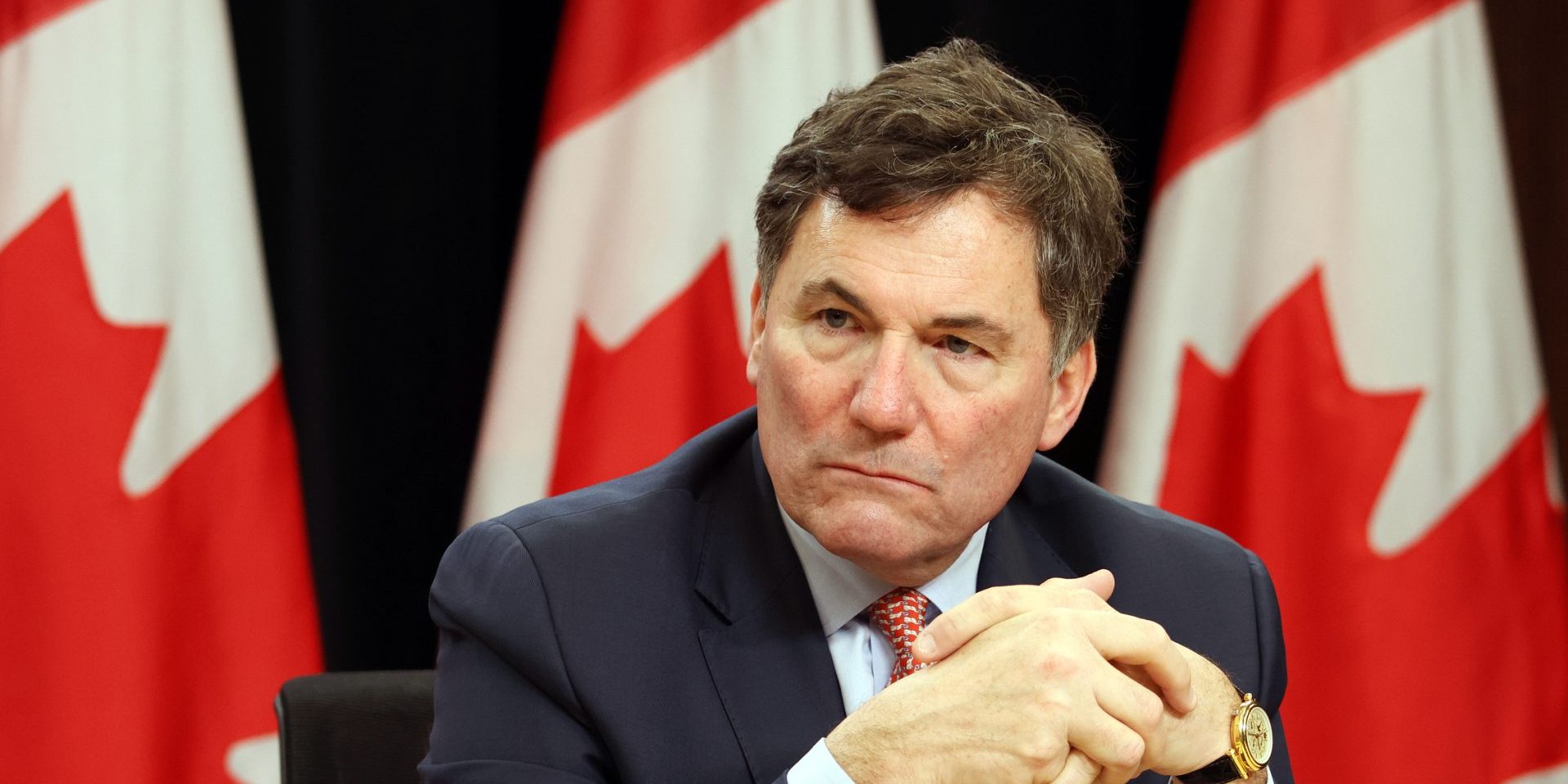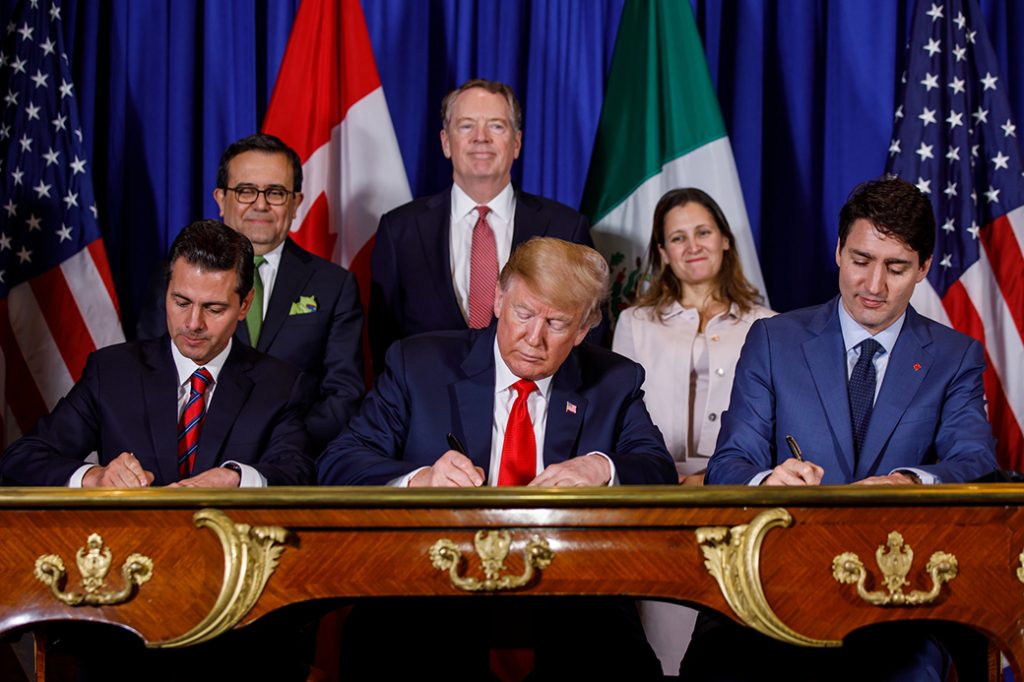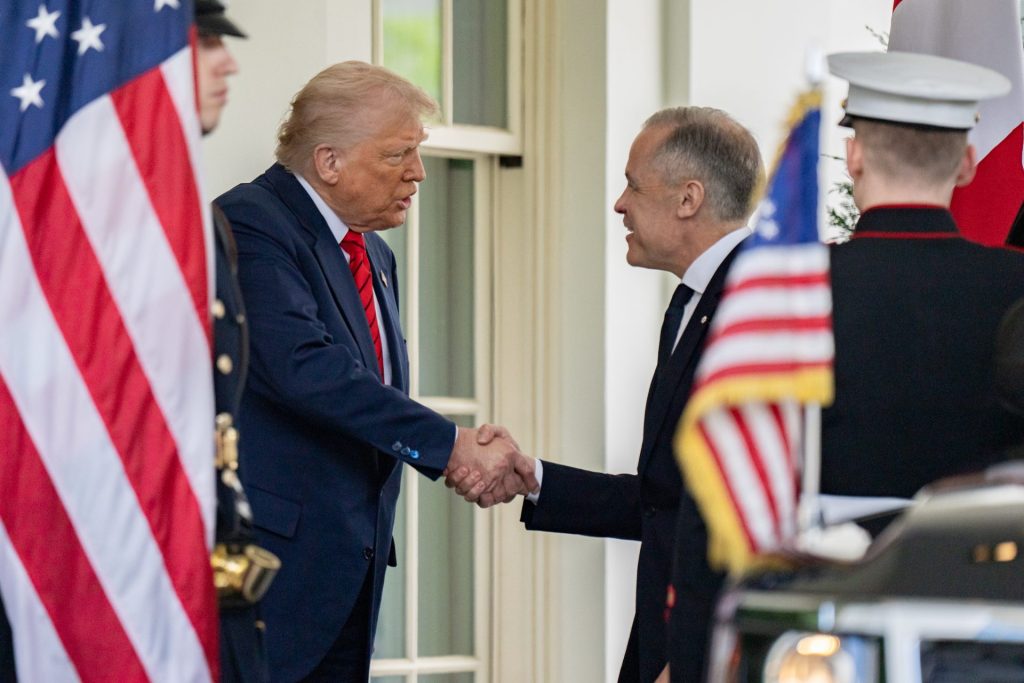Feds mum on timing of crucial North American trade pact meeting anticipated to ‘set the stage’ for 2026 review

The timing for an annual meeting of trade ministers from Canada, United States, and Mexico—which has added importance being the last one before a likely renegotiation of Canada’s most consequential free trade deal—has yet to be publicly revealed.
The Canada-United States-Mexico Agreement (CUSMA) Free Trade Commission (FTC) is typically held around the anniversary of its entry into force, which occurred on July 1, 2020. The 2025 iteration and fifth FTC is set to be hosted by Canada. An internal Global Affairs Canada memo that was circulated last December indicated that it would occur in “mid-2025.”
Global Affairs Canada didn’t directly answer a question regarding when the meeting will take place.
“We remain in close contact with our American and Mexican counterparts and will share updates as soon as more information becomes available,” department spokesperson John Babcock told The Hill Times in an email.
The briefing note for then-international trade minister Mary Ng stated that the 2025 FTC would include discussions on preparations for the CUSMA review.
“The fifth FTC meeting will take place at a critical juncture for CUSMA,” the memo notes.
It will be the first FTC meeting since the Trump administration returned to power in January and since Mexican President Claudia Sheinbaum’s victory last October. The latest meeting in a given calendar year was in 2023, when the FTC took place on July 13. Other FTC gatherings have taken place on July 8, May 23, and May 18.
A CUSMA review is mandated for 2026—after the agreement is in force for six years. As part of the review, any party to the agreement can decide to leave the pact, which would start a 10-year period of annual reviews that would end with the country withdrawing from the agreement, if it doesn’t change course.

“This will be the last meeting of the CUSMA FTC prior to the review of the overall agreement in 2026. As such, key components of the 2025 FTC will likely include in-depth discussions on CUSMA-related issues, including preparation for the 2026 CUSMA review, chapter-specific reviews from the labour and environment committees for ministerial consideration, and stakeholder engagement,” the memo reads.
The memo was drafted following U.S. President Donald Trump’s victory in the 2024 presidential election, but before he returned to the White House. The heavily redacted briefing note was obtained by The Hill Times under the Access to Information Act.
Trade observers have suggested the review will likely take the form of a renegotiation when the sides meet next year.
‘Hugely important forum’
Canadian Labour Congress senior researcher Elizabeth Kwan said the expectation is for an upcoming FTC to “set the stage” for the trade deal renegotiation in 2026.
“It is very important for the FTC to come together and have a good discussion about how to move forward, setting out the understanding of the process, as well as setting out some of the key areas that they would like to look at,” she said, remarking that she would like to see labour, environment, and inclusive trade highlighted.
Kwan said she isn’t surprised the timing of the meeting has been delayed.
“Since we’re living in unusual times, it is not a bad thing,” she said. “It is important for the FTC to take very seriously the responsibility that they have to shepherd the next steps towards the CUSMA renegotiation, and not to punt it too far down the line.”
She said there is a need for the commission to “show leadership,” and not be overly influenced by the tariff environment that currently exists.
Canadian Chamber of Commerce director of international policy Gaphel Kongtsa said this year’s FTC is “particularly significant” given the approaching review.
“It is an opportunity for Canada as the host country to leverage the platform of the FTC to demonstrate leadership on North American trade,” he said, remarking that it is a “hugely important forum” that “connects the trade leads for all three governments and brings them together in a very focused way for a discussion around trade and the CUSMA review.”
Kongtsa described the commission as a “rare” opportunity to show leadership, remarking that it is important for Ottawa to “maximally leverage” the moment by putting forward an agenda to further integrate North American trade.
Like Kwan, Kongtsa said he also isn’t surprised that the dates have yet to be announced.
“Ideally, we would know and there would be more certainty around this,” he said. “But, I think, given all the uncertainty and chaos when it comes to trade, it’s really unsurprising that the U.S. administration is not as focused on the FTC as it might ordinarily be.”
He said that’s because U.S. trade officials are stretched thin due to ongoing global tariff negotiations, as well as ongoing Section 232 tariff investigations and the statutory mandated domestic consultation on CUSMA.
The U.S. most recently came to agreement on a trade deal with the European Union, which would lock in a 15-per-cent tariff, and not offer reprieve on a 50-per-cent tariff on steel and aluminum tariffs.
“There’s a whole host of logistical and bandwidth challenges that the U.S. administration is currently facing, and I think that one unsurprising outcome of that is delay and uncertainty,” Kongtsa said.
But he said he thinks it is still “very likely” that the FTC will occur this year.
“I think the U.S. government will need to redirect its attention to the CUSMA review,” Kongtsa said, suggesting that the FTC will likely happen in the fall given any additional delay wouldn’t give much time to prepare for the review.
Trump still committed to CUSMA: analysts
While much focus has been on Canada’s trade negotiations with the U.S., as it seeks to reach a deal to lower tariffs ahead of the Aug. 1 deadline, trade observers say that work isn’t being done without the CUSMA in mind.
“CUSMA is still pretty central,” said Kwan, noting the exemptions for goods that are CUSMA-compliant to Trump’s 25-per-cent International Emergency Economic Powers Act tariffs placed on Canadian exports under the guise of combating a fentanyl and border crisis. “That indicates to me that it is still very important.”
Trump has threatened that the across-the-board tariff will jump to 35 per cent for non-CUSMA compliant products after Aug. 1.

Prime Minister Mark Carney (Nepean, Ont.) told reporters on July 28 that the negotiations are in an “intense phase.” Trump has suggested that an agreement won’t be reached with Canada.
That is despite Trump proclaiming that the CUSMA is a transitional trade deal. The American president hasn’t indicated what the deal is transitioning to.
Kongtsa said that while there is uncertainty, the U.S. has shown signals it is interested in preserving CUSMA, remarking that the tariff exemptions for CUSMA-compliant exports are a “good example” of that.
He said the FTC will help to reveal “critical insights” to how the U.S. is positioning itself and its priorities heading into the review.
“As of right now, we’re piecing together how the U.S. administration might tackle the review, but the FTC will be an opportunity to more formally ascertain what the U.S. government’s priorities are,” Kongtsa said.
Labour review timing being discussed: GAC
The timing for the review of the labour chapter of CUSMA is “presently” being discussed between the parties of the pact, according to a GAC spokesperson.
“With regards to the labour chapter review, the parties are presently discussing the timing, logistics, and program for conducting the review, including the possibility of doing so during the next meeting of the CUSMA Labour Council, which is tentatively scheduled to occur in Canada in the fall of 2025,” Babcock said in an email.
“The program for the Labour Council meeting will include a public session, giving the parties an opportunity to engage with stakeholders on the operation and effectiveness of the labour chapter. More information regarding the Labour Council meeting and public session will be shared with stakeholders once the parties have finalized their discussions,” he added.
The labour review is the second of two reviews that are mandated to occur this year. The review of the environment chapter was completed on June 17, which included the participation of all three countries to the pact. The minimalistic review included a reaffirmation of the importance of environmental co-operation.
Kwan called the environmental chapter review “a little bit disappointing.”
“There was enough space to look for improvements during that review, and I think they basically passed on that opportunity, which is really too bad,” she said.
Kwan said she hopes that the labour chapter review is “more robust,” and includes stakeholder participation. But she said that the FTC will be “the central body” of CUSMA, which has a higher responsibility to steer the pact compared to the chapter-specific reviews.
nmoss@hilltimes.com
The Hill Times






 LICENSING
LICENSING PODCAST
PODCAST ALERTS
ALERTS













